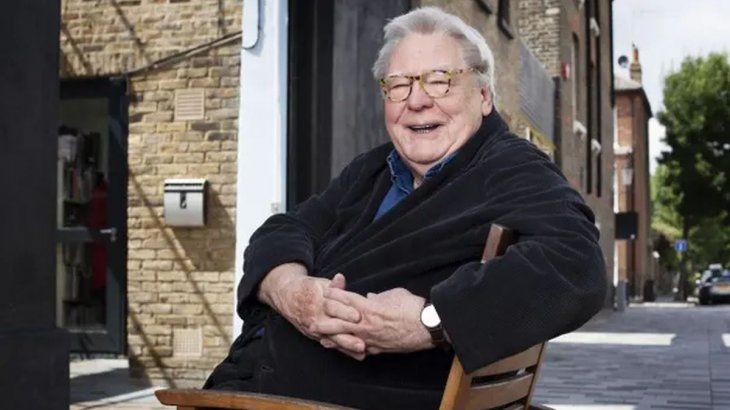A reissue in the USA. of “The making of Evita”, Alan Parker’s memory book about the sometimes somewhat eventful filming of the musical by Lloyd Webber and Tim Rice in Buenos Aires in 1995, allows us to look back not only at some of the unusual episodes of that adventure in which Madonna ended up singing “Don’t Cry For Me Argentina” on the authentic balcony of the Casa Rosada, by express authorization of then-president Carlos Menem.but also to a fact that is sometimes not taken into account in this type of Babel-style productions: the English language is the one that rules but, since not everyone masters it well, Chance and nonsense are waiting to appear at any moment.
Parker says that, one morning, he had arrived very early to a scene that he had to shoot in La Boca (“the crazy and dangerous port area of Buenos Aires” he calls it, without being too moved by the picturesqueness). And, as the body sometimes dictates, before heading to the filming location he had to go to the bathroom of a bar. Journalists were not allowed to approach the film crew or come into contact with any of the stars. (We must remember that, at least during the first days, the treatment given to those who came to film that musical hated by the most orthodox Peronism wasn’t exactly the most cordial), and then what the director tells below happened.
“While I was doing my business, a man ran in and stood next to me at the neighboring urinal. As I turned slightly to the opposite side to have a bit of privacy, the gentleman, with one hand on his recorder, which he held in front of my face while he pulled down his fly with the other, began to mumble a unintelligible question which revealed that his English had not gone beyond“The first month of the Berlitz academies.”
According to the director, the journalist shot him, point-blank, what he thought “of the prostitute who played the role of Madonna.” The only thing I understood, Parker says, was that the question was hostile. Nothing else. “‘He’ll do just fine,’ I replied very quietly, knowing that the noise of his pee would drown out my voice when I wanted to listen to the tape. Then, as he continued to chatter about less intelligible things, I shrugged my shoulders and left. Finally, He ran off like he’d gotten some scoop. As I was washing my hands, wondering how much crazier this could get, I heard a cell phone ringing in one of the bathroom stalls. Behind the closed door, the occupant said, while pulling on the toilet paper roll: ‘No. Parker won’t talk. But I just heard it while he was giving an interview.”.
Although this type of episode is not uncommon in filming with international stars, what is reported below borders on surrealism. Parker says that, as he headed to the filming location, a cobblestone street that the production had specially chosen and was fenced off to prevent prying eyes, He began to hear a lot of high-pitched barking. And that, when she arrived at the street in question, she found about twenty poodles.
alan parker.jpg
Alan Parker tells everything in “The making of Evita”.
Courtesy of The Guardian
“What does this mean?” he asked his director of photography, Darius Khondji. “What does it mean that?” “This! Dogs! What are they doing here?” “I don’t know. “I didn’t ask for them,” he replied. Parker says in the book that it was the first time he worked with Khondji, “a Frenchman of Persian descent, very friendly and professional. His personality made the shoot a constant delight, as he blended in perfectly with my regular crew. The problem was his English”. And he continues: ‘The art department brought in 20 poodles and says you asked for them!’ ‘I never asked for that.’ He shrugged as only the French can. ‘I asked for what you asked for, poodles [poodles]that which forms on the ground when it rains‘. The assistant directors and I wanted to die: “I asked for ‘puddles’ [puddles]”Parker responded, between laughter and astonishment.. She looked at us like we were crazy. “And well, that’s it, poodles [poodles]No dogs.”
To an ear not accustomed to English, the difference between “poodles” and “puddles” is practically imperceptible. Now, beyond the funny nature of the anecdote, and the truthfulness that we can grant to Parker’s story, what surprises the connoisseur of Hollywood history is that It is an almost exact replica of one of the many stories told by the famous director Michael Curtiz (1886-1962), the director of “Casablanca”, a Hungarian who came to the United States in 1926 for a Warner contract, and who would become one of the most prolific of the golden age of studio cinema. Curtiz’s problem was, like Khondji’s, that he never mastered English. “Dad spoke five languages,” his son once said. “And he destroyed them all.”
It is said that, precisely During the filming of “Casablanca” (1942), Curtiz had the same lapse. The difference was that his character was never gentle. “I want a poodle,” he once asked the props manager. “A poodle? “Okay, sir, I’ll have to go get it because you didn’t ask for it.” “Go get it then.” “What color?” “Dark!, idiot, we are not shooting this movie in color.” The man returned a few hours later with the dark poodle. “And why do I want that stupid dog?” He then yelled at her. “You asked me for a poodle, Mr. Curtiz,” said the frightened assistant. “I want a poodle on the street, a water poodle on the street!”. Too much coincidence or inspiration from Parker in his scrapbook? It will never be known.
Curtiz’s pronunciation errors were so numerous that they could fill an entire book. Let’s finish this review with the most famous, much more than the poodle/puddle one. It happened during the filming of one of his Western classics, “The Charge of the Light Brigade” (1936), also an epic classic from Warner, with Errol Flynn, Olivia de Havilland and David Niven.among others.
In a scene in which Curtiz needed a panoramic view of the horses, but without their riders, he took the megaphone and shouted to his assistants: “Bring on the empty horses!” This is, literally, “Bring on the empty horses.”. David Niven and Flynn, witnesses of the moment, began to double over laughing, to the point of enraging Curtiz, who shouted at them: “You think I know fuck nothing; “I tell you: I know fuck all.” .
Source: Ambito
I am an author and journalist who has worked in the entertainment industry for over a decade. I currently work as a news editor at a major news website, and my focus is on covering the latest trends in entertainment. I also write occasional pieces for other outlets, and have authored two books about the entertainment industry.




